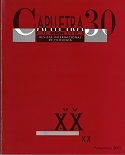Els marcadors pragmàtics compostos en el relat oral anglès i català
DOI:
https://doi.org/10.7203/caplletra.30.4958Palabras clave:
marcadors pragmàtics compostos, relat oral, anglès, català Resumen
Resumen
Pragmatic markers are linguistic units that the speaker uses to organize, recover, reformulate and segment the information that
s/he supplies to the hearer. They are a feature of oral rather than written discourse. They have little or no propositional meaning. By
means of pragmatic markers, the speaker transmits intentions, actions, and thoughts. They help to make a text coherent in as much as they are cues that facilitate the cognitive processing of information and constrain inferences and presuppositions. They are
multifunctional, operating at several discourse levels simultaneously: sequential, rhetorical and ideational (Redeker 1990). Their omission involves a violation of gricean cooperative principle, and the maxims of quantity and relevance in particular. The pairing of two or more pragmatic markers results into a compound pragmatic marker (CPM). These units facilitate, to a great extent, the shifts onto distinct contextual realms or discourse structures (ideational, sequential and rhetorical). Their combinatory functions result into a) a change of attentional state of the speaker or shift of cognitive frame, and b) a remarkable emphasis on the illocutionary point of the segment. When a CPM is used, the processing cost of information is lowered.
 Descargas
Descargas
Descargas
Publicado
Cómo citar
-
Resumen368
-
PDF (Català)351
Número
Sección
Licencia
El autor o autora que dirija un trabajo a la redacción de Caplletra para ser publicado tiene que ser la persona titular legítima de los derechos de explotación. La legitimación para la publicación del trabajo tiene que incluir también las imágenes, las tablas, los gráficos y otros materiales que puedan complementar el texto, con independencia de si es su autor o autora.
Copyright. Al publicar el trabajo en la revista, el autor o autora cede a Caplletra. Revista Internacional de Filologia los derechos de explotación (reproducción, distribución y comunicación pública), tanto para la edición impresa en papel como para la versión electrónica.
Todos los trabajos publicados en Caplletra se encuentran bajo una licencia Creative Commons del tipo Reconocimiento-NoComercial-SinObraDerivada 4.0.
RESPONSABILIDAD
Caplletra. Revista Internacional de Filologia no se identifica necesariamente con los puntos de vista sostenidos en los trabajos que publica.Caplletra. Revista Internacional de Filologia declina toda responsabilidad derivada de cualquier vulneración eventual de los derechos de propiedad intelectual que pudiera ser llevada a cabo por los autores o autoras.






